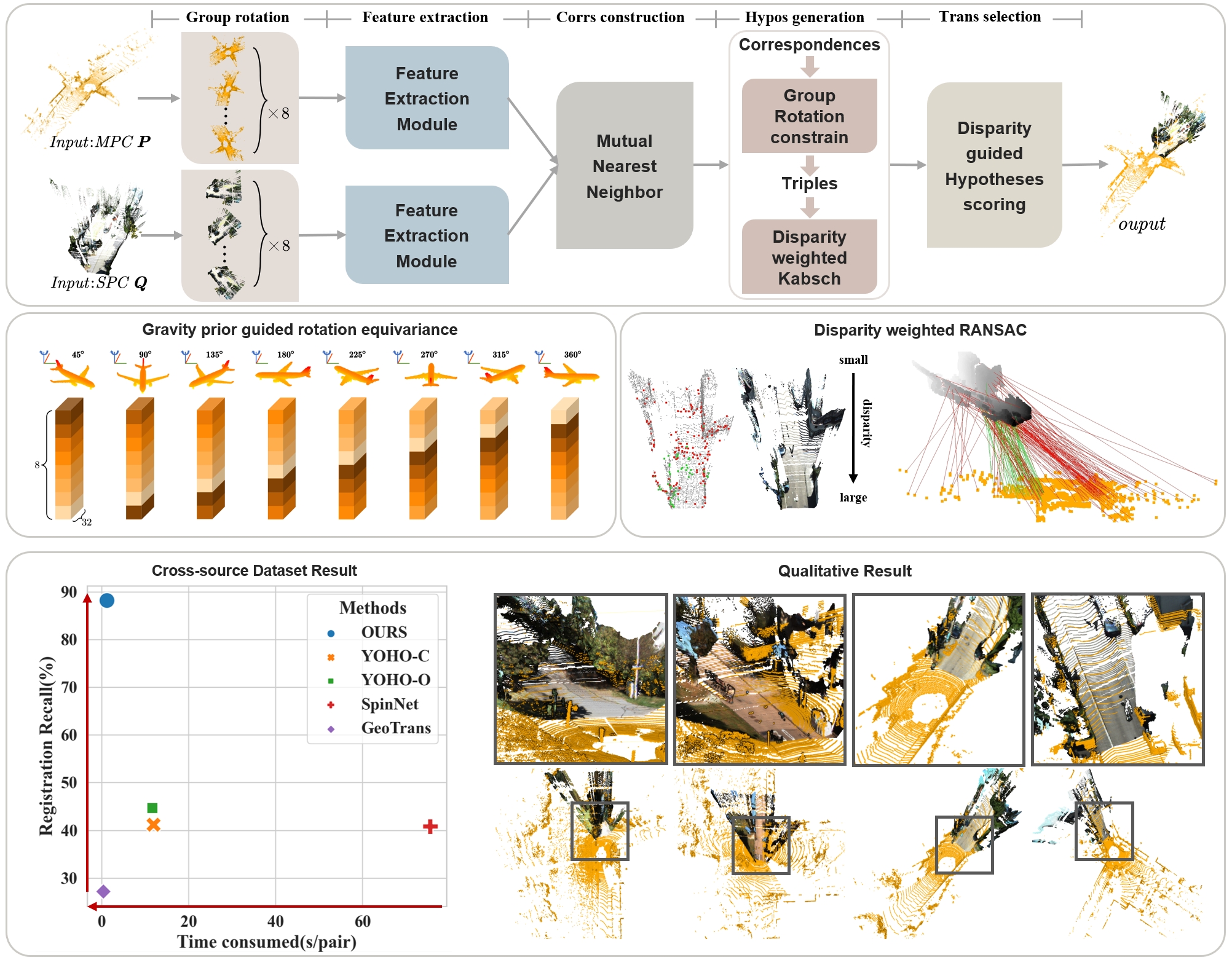Abstract: Cross-source point cloud registration is a prerequisite for effectively leveraging the complementary information of multiple 3D sensors. However, existing point cloud registration methods have primarily focused on the registration of mono-source point clouds and typically fail to register cross-source data with varying noise patterns and capture characteristics.
In this paper, we present a new algorithm for cross-source point cloud registration between MLS point clouds and stereo-reconstructed point clouds.
Our method has two key designs. Firstly, we design a novel descriptor with in-plane rotation-equivariance by leveraging the accessible gravity prior, yielding strong descriptiveness, better robustness, and improved efficiency. Secondly, based on the noise pattern of stereo-reconstructed point clouds, a novel disparity-weighted correspondence scoring strategy is proposed to strengthen the registration accuracy.
In comparison to existing registration baselines, our method achieves a
Here we offer the FCGF backbone YOHO. Thus FCGF requirements need to be met:
- Ubuntu 14.04 or higher
- CUDA 11.1 or higher
- Python v3.7 or higher
- Pytorch v1.6 or higher
- MinkowskiEngine v0.5 or higher
Specifically, The code has been tested with:
- Ubuntu 20.04, CUDA 11.1, python 3.7.10, Pytorch 1.7.1, GeForce RTX 3080Ti.
-
First, create the conda environment:
conda create -n msreg python=3.7 conda activate msreg -
Second, intall Pytorch. We have checked version 1.7.1 and other versions can be referred to Official Set.
conda install pytorch==1.7.1 torchvision==0.8.2 torchaudio==0.7.2 cudatoolkit=11.1 -c pytorch -
Third, install MinkowskiEngine for FCGF feature extraction:
git clone https://github.com/NVIDIA/MinkowskiEngine.git cd MinkowskiEngine conda install openblas-devel -c anaconda export CUDA_HOME=/usr/local/cuda-11.1 python setup.py install --blas_include_dirs=${CONDA_PREFIX}/include --blas=openblas cd ..Or following official command installation:
https://github.com/NVIDIA/MinkowskiEngine.git -
Fourth, install other packages:
pip install -r requirements.txt -
Finally, compile the CUDA based KNN searcher:
cd knn_search/ export CUDA_HOME=/usr/local/cuda-11.1 python setup.py build_ext --inplace cd ..
The datasets and pretrained weights have been uploaded to Google Cloud:
For training:
For testing:
Pretained model:
Datasets above contain the point clouds (.ply) and keypoints (.txt, 5000 per point cloud) files. Please place the data to ./data/origin_data following the example data structure as:
data/
├── origin_data/
├── kitti_train/
├── 0/
├── PointCloud/
├── cloud_bin_0.ply
├── ..
└── gt.log
└── Keypoints/
└── cloud_bin_0Keypoints.txt
└── icp/
├── CS/
└── CTCS/
Pretrained weights we offer include FCGF Backbone and msreg trained model. Which have been added to the main branch and organized following the structure as:
model/
├── Backbone/
└── best_bal_checkpoint.pth
├── train/
└── model_best.pth
To train MSReg, the group input of train set should be prepared using the FCGF model we offer, which is retrained with our data enhancement, sepcifically, for pc0 and pc1: 1.ground truth alignment 2.add the same group element rotation; for pc1: add a random rotation of 45°.
python trainset.py
Then, you can train MSReg by the commands:
python Train.py
- Prepare the testset:
python testset.py --dataset kitti_test - Evaluate the results:
python Test.py --max_iter 1000 --dataset kitti --ransac_d 0.5 --tau 2
To evalute the generalization results of MSReg on CTCS and CS:
- Prepare the testset:
python testset.py --dataset CTCS python testset.py --dataset CS - Evaluate the results:
python Test.py --max_iter 1000 --dataset CTCS --ransac_d 1.5 --tau 2 python Test.py --max_iter 1000 --dataset CS --ransac_d 1.5 --tau 2
We sincerely thank the excellent projects:
